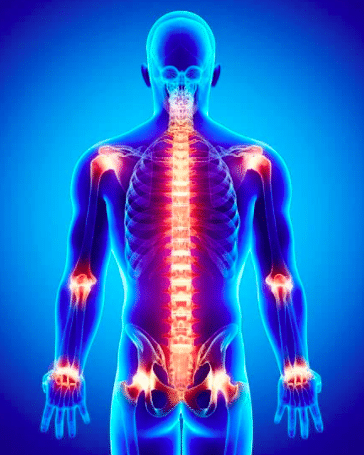

WHAT IS INFLAMMATION AND HOW CAN YOU REDUCE IT?
Inflammation – you’ve probably heard the term before. It’s characterized by discomfort and reaction within the body, and is almost never good. In this article, we’ll review the problem and what you can do when faced with it.
What Is Inflammation?
We all know what inflammation is like – a puffed, swelled part of the body that’s often accompanied by pain and redness. But really, what is it? Inflammation is a part of the body’s natural immune response. It occurs when the body is inflicted with something that can cause it harm, like bacteria or injury. In response, the body releases chemicals into the bloodstream that help to fight off the foreign invader or repair the damaged tissue. This process is what causes the swelling, discomfort, and redness.
Many people tend to confuse inflammation with infection. While they commonly present the same symptoms, the two are different types of reactions. Infection is caused by bacteria, viruses, or other microorganisms that enter the body and begin to multiply. Inflammation, on the other hand, is a response of the body’s immune system to any number of stimuli – infection being just one of them.
How Does Inflammation Work?
Inflammation is a process in which white blood cells and other protective cells are released into the body to fight off incoming threats, such as bacteria or trauma. During inflammation, damaged cells release various chemicals into the body, such as bradykinin, histamine and prostaglandins. These agents cause blood vessels to leak fluid into tissues, causing swelling. In addition, these chemicals recruit more white blood cells to the area of injury or infection.
Common causes of inflammation include:
- Infections
- Trauma
- Frostbite
- Allergies
- Immune system disorders
- Cancer
There are two types of inflammation: acute and chronic. Acute inflammation is the body’s immediate response to a perceived threat. It begins quickly and lasts for a short period of time, usually no longer than a few days. Chronic inflammation, on the other hand, is a low-level inflammation that lasts for weeks, months or even years. It’s often the result of an autoimmune reaction, in which the body perceives its own tissues as foreign invaders and attacks them.
Symptoms of Inflammation
The symptoms of inflammation vary depending on the type and severity of the condition.
However, common symptoms of inflammation include:
- Pain
- Redness
- Swelling
- Heat
- Loss of function
Most of the time, these symptoms are temporary and will go away once the underlying cause has been treated. However, in some cases, chronic inflammation can lead to permanent tissue damage.
How To Reduce Inflammation
There are a number of things you can do to help reduce inflammation. These will vary in relevance based on your circumstance, however are all great to consider.
Exercise and Stretch Regularly
Exercise has been shown to help reduce inflammation. Not only does it help to keep your body healthy, but it also releases endorphins, which can help to improve your mood and reduce stress. Stress is a major trigger of inflammation, so anything you can do to reduce it will be helpful. Regular stretching can also help to reduce inflammation by keeping your muscles and joints flexible.
Eat Anti-inflammatory Foods
Certain foods have anti-inflammatory properties that can help to reduce inflammation throughout the body. These include fatty fish, such as salmon, mackerel and tuna, as well as fruits and vegetables, such as blueberries, oranges, tomatoes and kale. In addition, olive oil, nuts and seeds are also good choices.
Of course, also be sure to avoid foods that can have an opposite effect. There are some foods that can trigger inflammation, such as processed foods, sugar, refined carbs, red meat, saturated and trans fats.
Get Enough Sleep
Sleep is important for overall health, but it’s also been shown to help reduce inflammation. When you’re sleep-deprived, your body releases more of the stress hormone cortisol. This heightens your inflammatory response and can make existing conditions worse. So be sure to get enough rest every night! While it can be tough in some circumstances, aiming for seven to eight hours is recommended.
Reduce Stress
As mentioned, stress is a major trigger of inflammation. If you’re constantly feeling stressed, it’s important to find ways to relax and unwind. This could involve things like yoga, meditation, deep breathing exercises or even just spending time outside in nature. Whatever works for you, make sure to take the time to de-stress on a regular basis.
Take Supplements
There are a number of supplements that have anti-inflammatory properties. These include omega-3 fatty acids, curcumin, ginger and garlic.
You can also try herbs, such as boswellia and ashwagandha. Always talk to your doctor before taking any supplements, especially if you’re on medication, as they could interact with each other.
Medications
There are a number of medications that can help to reduce inflammation. These include over-the-counter options, such as ibuprofen and aspirin, as well as prescription medications, such as corticosteroids and immune-suppressing drugs.
Of course, it’s always best to talk to your doctor before starting any new medication, as they can advise you on the best option for your specific situation.
Use Heat and Cold Therapy
Applying heat or cold to an inflamed area can help to reduce pain and swelling. For instance, you might try using a heating pad for muscle soreness or applying an ice pack to a swollen joint. Just be sure not to overdo it, as too much heat or cold can actually make things worse.
Acupuncture
Acupuncture is a traditional Chinese medicine technique that involves inserting thin needles into the skin at specific points. It’s often used for pain relief, but it can also help to reduce inflammation.
A number of studies have shown that acupuncture can be effective for treating inflammatory conditions, such as rheumatoid arthritis. However, it’s always best to consult with a licensed practitioner before trying it.
Identify Your Inflammatory Triggers
Considering how inflammation is a response to irritation, it makes sense to figure out what will and won’t cause your system to react. For example, if you have an allergy to a certain food, avoid eating that food. If you have arthritis, try to avoid activities that put stress on your joints. This can be helpful in preventing inflammation from worsening as well as prevent it altogether.
While inflammation is a natural and important process, it’s important to keep it under control. If you’re struggling with inflammation, talk to your doctor about the best course of treatment for you. In some cases, medication may be necessary to help control the inflammation. However, there are a number of natural ways to help reduce it as well. By following these tips, you can help to reduce inflammation and improve your overall health!
